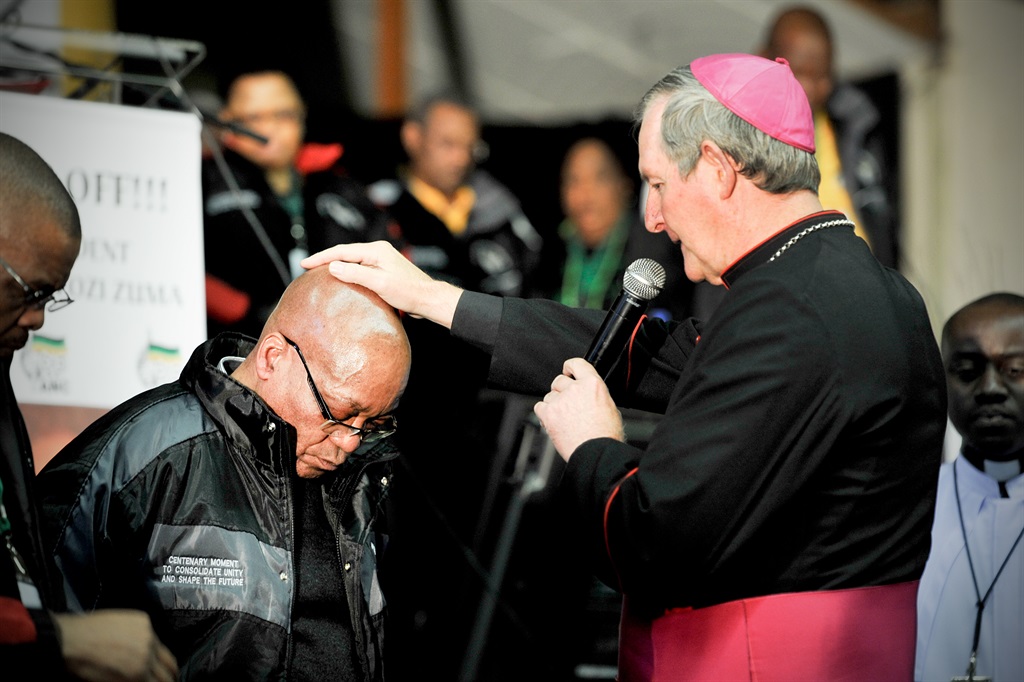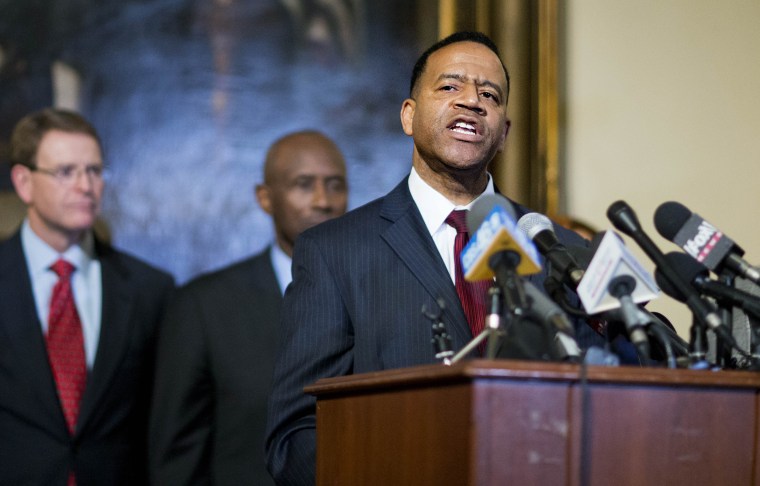ANALYSIS | God and politics in South Africa: The governing ANC’s winning strategy

A priest praying for Jacob Zuma at the Free State
provincial conference on 24 June 2012 in Parys. (Photo by Gallo Images /
Foto24 / Lerato Maduna)
The ANC in many respects remains committed to a secular
state and many of its policies yet the party is also religious in
important senses. David Jeffery-Schwikkard writes the party may have found the winning formula.
Religion
shapes some of the most controversial decisions that governments need
to make: access to abortion, same-sex marriage, the death penalty and
the legal status of sex work. Indeed, it is likely that most voters
across the world consider religion to be essential to their lives.
Yet research on religion and political parties remains surprisingly inexact.
Much of the research
to date has been waylaid by the wrong question: is a political party
fundamentally religious or secular? Yet the “essence” of a party resists
definition. Is it its manifesto, rhetoric, membership or leadership?
What if these contradict each other? What would it mean if religion was
integral to officially secular parties?
The difficulty of this approach is clear when considering a party like the African National Congress (ANC),
which has governed South Africa since 1994. From one angle, it is
obviously not a religious party: it remains committed to a secular state
and many of its policies (such as those on abortion and civil unions) have been criticised by religious groups.
Yet
the ANC is also religious in important senses. In most of the country,
you would struggle to find an ANC meeting that did not start and end
with a prayer. Nearly all leaders in the past century have been devout.
For many supporters, religion is the water in which the ANC swims.
Rather than asking whether a party is religious, we should look at how it engages with religion. I examined the issue in a recent article.
I sought to describe how contemporary parliamentary parties in South
Africa had engaged with religion throughout their history, and how
academics had analysed this.
It’s possible to learn a great deal
about a political party by looking at how it uses religion. My study
identified a consistent political strategy: the mix of religious
rhetoric and a secular policy agenda by the ANC over the past century.
This strategy has been popular with the party, which has won every national election with a margin of at least 34 percentage points
ahead of the second-largest party. It’s a strategy that works in
countries that have the unusual combination of religious electorates and
secular governments, such as Kenya and Senegal.
Rather than being a threat to secular democracy, religious rhetoric may be important for ensuring a largely religious electorate feels politically at home in a secular state.
Religion and political parties in South Africa
My
review of academic publications on religion and political parties in
South Africa looked at three sets of rules governing party members:
informal rules (such as what you can say at public events)
party rules (such as disciplinary codes and who makes decisions)
the kind of laws proposed by the party.
I
distinguished between the religious or secular emphasis in each of
these, and noted whether this emphasis was inclusive of other beliefs.
The framework offered three key insights.
First, political parties engage with religion with nuance and ambiguity. This applies elsewhere in the world too: Adalet ve Kalkinma Partisi
in Turkey, for example, relies on a religious electorate for support.
Yet it must navigate an officially and sometimes militantly secular
state. However, in contrast to South Africa’s major political parties,
it manages this tension
by insisting that it is an inclusive and non-religious party in its
rhetoric, while simultaneously pursuing laws that privilege Sunni Islam.
Second, the ANC sometimes uses religious rhetoric while pursuing secular laws and party rules – a combination it has used for most of its history.
Third,
this nuance might be important to voters in South Africa. Parties that
pursue policies underpinned by religion do very poorly in elections. An
example of this is the African Christian Democratic Party (ACDP), which claims to offer policies based on the Bible.
About 78% of South Africans identified as Christian in 2016. While estimates vary significantly, between 45% and 74% report being “very” or “highly religious”, and 76% agree that
God’s laws about abortion, pornography and marriage must be strictly followed before it is too late.
The ANC and religion
Christianity has been important to the ANC’s values and practices since the party’s beginning in 1912. In 1949, for example, it called for an annual day of prayer to remember
Christ who is the Champion of Freedom.
Many regions in the country that participated most actively in the 1952 Defiance Campaign, a large non-violent campaign of civil disobedience against apartheid, were led by local churches. ANC president Albert Luthuli, who led the organisation from 1952 to 1967, was famously vocal about his religious convictions. This was also true of most presidents of the ANC before him, including Reverend John Langalibalele Dube and Reverend Zaccheus Richard Mahabane.
Yet the ANC has also always been an ideologically diverse organisation. It has included followers of other religions, communists, traditionalists and Garveyites who advocated transnational black nationalism.
In
the 1960s the religious rhetoric of the ANC became more ambivalent.
Within the context of the Cold War, the organisation worked more closely
with the South African Communist Party and increasingly espoused a Marxist-Leninist ideology.
Yet even so, ANC president Oliver Tambo, who led the ANC in exile from 1967 to 1991, continued to publicly espouse the unbroken link between the ANC and the church.
The
ANC would call for days of prayer, establish a department of religion,
publicly affirm liberation theology and issue joint communiqués with
churches. In the early 1990s, the ANC advocated a secular state in constitutional negotiations with the ruling National Party. Yet even in the 1994 election, the message was mixed.
ANC advertisements featured religious leaders
who argued that the manifesto that best represented “gospel values” was
that of the ANC. Conversely, the ANC also promised improved access to
abortion: a policy criticised by religious leaders.
This mix of secular laws and religious rhetoric extended into the post-apartheid era. Former ANC president Jacob Zuma’s frequent references to religion, for example, invited concern about the ANC’s “creeping Christian conservatism”, while the party began exploring decriminalising sex work.
Religion and politics
Perhaps
the combination of religious rhetoric and secular laws is a winning
electoral strategy. After all, parties that advocate religious laws have
surprisingly little support from voters: the ACDP and Al Jama-Ah, a Muslim political party, have at most won 1.6% (in 2004) and 0.18% (in 2019) of the national vote, respectively. At their best, the ACDP has been the seventh-largest party and Al Jama-Ah the 14th.
Conversely,
parties that advocate secular laws but shy away from religious
rhetoric, such as the main opposition Democratic Alliance, have also
failed to win popular support, especially in rural areas. Of course,
many other reasons contribute to this too.
In short, we can learn
much about a political party by looking at how it uses religion. The
ANC may have a winning strategy in its combination of religious rhetoric
and a secular policy agenda.
David Jeffery-Schwikkard, PhD Candidate (Theology and Religious Studies), King's College London
This article is republished from The Conversation under a Creative Commons license. Read the original article.







